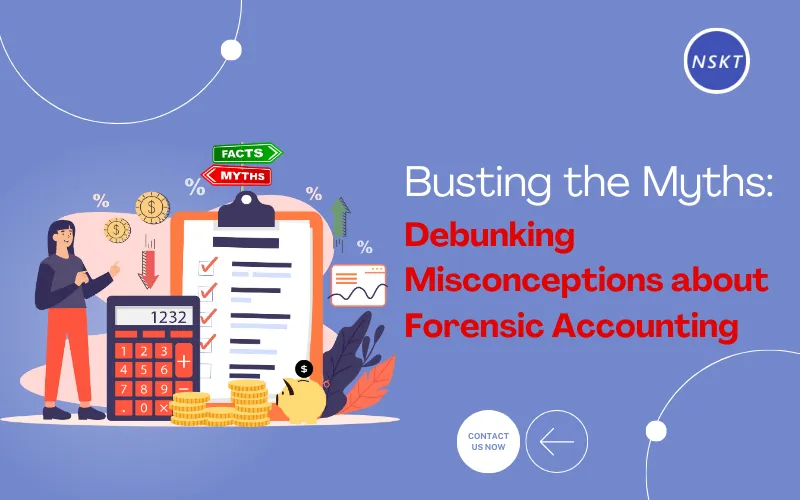Table of Contents
The Truth Behind Forensic Accounting
When we think of forensic accounting, our minds might conjure up images of crime scene investigations, high-profile court dramas, and complicated financial jargon. However, forensic accounting is much more than a thrilling subplot in a crime novel. In this blog, we aim to demystify forensic accounting and debunk some common misconceptions surrounding this essential financial discipline.
Myth 1: Forensic Accountants are Investigators in Crime Scenes
Fact: Forensic accountants don't investigate physical crime scenes. Instead, they analyze financial records and data to detect financial misconduct. They work in offices, examining financial documents, conducting audits, and collaborating with law enforcement and legal professionals.
Myth 2: Forensic Accountants are the Same as Traditional Accountants
Fact: While both traditional accountants and forensic accountants deal with finances, their roles and responsibilities differ significantly. Traditional accountants focus on preparing financial statements, tax planning, and compliance. On the other hand, forensic accountants delve into financial data to investigate and prevent fraud, as well as provide litigation support when disputes arise.
Myth 3: Forensic Accounting is Only for Large Corporations
Fact: Forensic accounting can be used by businesses of all sizes.
While it is true that large corporations may have more complex financial structures and a greater need for forensic accounting, this does not mean that it is exclusive to them. Fraud and financial misconduct can happen in businesses of all sizes. Small and medium-sized enterprises (SMEs) can also benefit from the expertise of forensic accountants to prevent, detect, and address financial discrepancies.
Here are some of the ways that forensic accounting can be used by SMEs:
- To investigate allegations of fraud or embezzlement
- To assess the financial damage caused by a natural disaster or other event
- To provide expert testimony in legal disputes
- To help with due diligence in mergers and acquisitions
- To develop and implement internal controls to prevent fraud
Forensic accountants can also be used by SMEs to provide guidance on a variety of financial matters, such as taxation, budgeting, and financial reporting.
Myth 4: Forensic Accountants Only Focus on Internal Fraud
Fact: While detecting internal fraud is a crucial aspect of forensic accounting, their expertise extends beyond the company's walls. Forensic accountants are well-equipped to investigate external fraud, such as vendor fraud, insurance fraud, and other financial crimes committed against a business.
Myth 5: Forensic Accountants Only Get Involved After a Crime Occurs
Fact: It's a common misconception that forensic accountants are brought in only when fraud is suspected or has already occurred. However, they can be proactive consultants, helping businesses set up robust internal controls and fraud prevention measures. By conducting risk assessments and suggesting best practices, forensic accountants can significantly reduce the likelihood of financial misconduct.
Myth 6: Forensic Accounting is Only Useful in Litigation
Fact: While forensic accountants do play a vital role in litigation, their expertise extends far beyond the courtroom. They are valuable consultants during mergers and acquisitions, contract disputes, and regulatory compliance matters. Their skills in analyzing financial data and providing expert opinions can help businesses make informed decisions and mitigate financial risks.
Myth 7: Forensic Accounting is an Easy Way to Get Rich Quick
Fact: Hollywood might portray forensic accounting as a path to quick riches, but in reality, it requires extensive training, experience, and a deep understanding of finance and the legal system. Like any profession, success in forensic accounting comes with dedication, hard work, and a commitment to upholding ethical standards.
Myth 8: Forensic Accounting and Auditing are the Same
Fact: While both forensic accounting and auditing involve a financial examination, they serve different purposes. Auditing is a systematic review of financial records to ensure accuracy and compliance, typically conducted by external or internal auditors. On the other hand, forensic accounting is a more specialized field that involves investigating financial irregularities, often with a focus on potential fraud or misconduct.
Safeguarding Financial Integrity with NSKT Global's Forensic Accounting Expertise
Forensic accounting is an intriguing and essential field that goes beyond the Hollywood portrayal of crime scene investigations. It is a specialized discipline that plays a critical role in detecting and preventing financial fraud, as well as providing valuable support in various financial matters. By debunking these misconceptions, we hope to shed light on the real significance of forensic accounting and the professionals who contribute to a fair and transparent financial world.
At NSKT Global, we recognize the importance of forensic accounting in safeguarding businesses and financial systems. Our team of dedicated forensic accountants is committed to upholding ethical standards while employing their expertise to protect our clients from potential financial misconduct. We offer proactive consultation to businesses of all sizes, helping them implement robust internal controls and fraud prevention measures.
Whether you're a business owner, or simply curious about the financial world, understanding the truth about forensic accounting can be beneficial in various aspects of life. Embracing the services of skilled forensic accountants like those at NSKT Global can provide the peace of mind and confidence needed to navigate the complex financial landscape.







